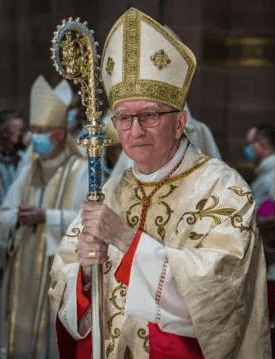Who Won and Who Lost in the Vatican-CCP Compromise on the Bishop of Shanghai
The Holy See has approved an appointment that Beijing made without authorization. The episode did, however, force the Vatican to admit that a “clandestine church” still existed.
Bishop Shen Bin, who had previously served as the bishop of Haimen, was appointed the new bishop of Shanghai by the CCP on April 4. The Holy See was informed about the installation by the media the morning it took place, according to an official Vatican statement.
The Vatican and China’s 2018 agreement, which was extended in 2020 and 2022, remains secret, although it is known that it governs the management of Catholic dioceses and the selection of bishops. The Vatican should formally appoint the latter, who are still chosen by the CCP. Shen Bin was not chosen by the Vatican to serve as the bishop of Shanghai in this instance. But he was put in place.
Pope Francis nominated Shen Bin as the Bishop of Shanghai, moving him from Haimen, the Holy See announced on July 15. Naturally, this occurred more than three months after the CCP had already put him in Shanghai. The Vatican claimed to have “rectified a canonical irregularity” for “the greater good of the diocese.”
The CCP seems to have been the only good provided. The event did, however, have repercussions. Cardinal Pietro Parolin, the Secretary of State of the Holy See, gave a lengthy interview that is more extensive in Italian than the English version issued by the Vatican.
He first acknowledged that the CCP broke the agreement, while the exact phrase is still classified. To prevent “differences and misunderstandings,” Parolin stated, “it is essential that all episcopal appointments in China, including transfers, be made by consensus, as agreed.” The Vatican had to acknowledge that the agreement had not been upheld with “surprise and regret.”
Another issue that hasn’t been resolved, according to Parolin, is the “regular communication of the Chinese Bishops with the Bishop of Rome, indispensable for effective communion, knowing that all this belongs to the structure and doctrine of the Catholic Church, which the Chinese authorities have always said they don’t want to alter.” In this instance, Parolin stated that bishops who have been properly nominated by the Pope do not stay in contact with him. Bishop Shen Bin pledged to “adhere to the principle of independence and self-government” that is at the heart of the Patriotic Catholic Church and has historically meant independence from the Vatican during his installation ceremony in Shanghai in April, long before Pope Francis appointed him. This is the exact tenet that the 2018 agreement ought to have changed.
Weibo user Bishop Shen Bin.
Third, Parolin said that Chinese Catholics “deserve trust,” and should be “respected in their conscience and their faith,” even if they are considered to be “clandestine.” Certainly not by accident, the term “conscience” was used. There was a lot of celebration when the Vatican-China agreement of 2018 was reached about the “clandestine” Catholic Church’s demise and eventual fusion with the Patriotic Catholic Church. Those who disputed this and pointed out that many Catholic conscientious objectors chose not to become members of the Patriotic Church came under fire from self-styled pro-Chinese “Vatican experts,” who claimed “Bitter Winter” and others were attempting to undermine the deal.
The “clandestine church” is still active, the Vatican Secretary of State has admitted. He reiterates the Vatican Guidelines of 2019’s (some say no longer in effect) demand that the adherents of this “clandestine church,” or the Catholic conscientious objectors who decline to join the Patriotic Church, be “respected.”
Our readers are aware that this is untrue; the only respect shown to Catholic conscientious objectors is in the form of abuse and detention. The Vatican was not given much respect in the case of Shanghai (or other places, either). The CCP may see its decision to accept even these additional flagrant violations of the agreement as a win. A crucial acknowledgment that the “clandestine church” still exists and a vague pledge that Rome, which does not perceive its members as rebellious, will attempt to safeguard them are, however, concealed in plain sight in Cardinal Parolin’s interview. If Cardinal Parolin is genuine in demanding “respect” for conscientious objectors, who will never be “respected” by the CCP, he has just planted a time bomb beneath the 2018 Vatican-China agreement that, if detonated, might lead to its destruction.













